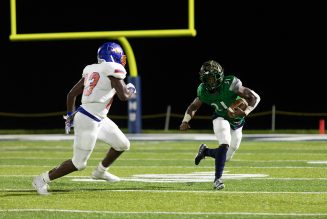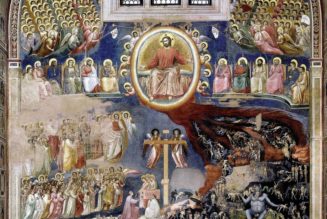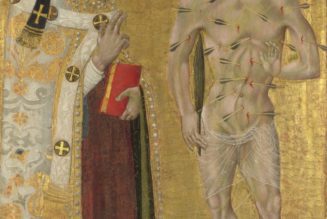
“Fear no one,” Jesus says on the 12th Sunday of Ordinary Time Year A. Then he gets deadly serious and declares: “Whoever denies me before others, I will deny before my heavenly Father.”
Jesus wants us to stop cowering before the power of sin and sophisticated faithlessness, and his Church is listening.
A week ago, the Los Angeles Dodgers celebrated the anti-Catholic hate group the Sisters of Perpetual Indulgence as “Community Heroes.” The mayors of Los Angeles and Anaheim, along with California legislators, the Los Angeles Times and USA Today celebrated them too.
Los Angeles Archbishop José Gomez joined his voice to thousands who protested the event, including recent Los Angeles Auxiliary Bishop Robert Barron who said, “Boycott the Dodgers. Let’s pray for the defense of our faith and let’s stand for our Catholic faith.”
In Sunday’s Gospel, Jesus asks for more of the same.
Last Sunday, Jesus saw “sheep without a shepherd” in the wounded relationships, addictions and social isolation of the people in our neighborhoods.
This Sunday, he looks at Catholics who keep our faith to ourselves instead of helping them, because we are too afraid we might offend somebody. He says: “Fear no one. Nothing is concealed that will not be revealed, nor secret that will not be known. What I say to you in the darkness, speak in the light; what you hear whispered, proclaim on the housetops.”
There is no reason to be ashamed of the authentic Catholic vision of the human person; we should shout it from the housetops. In the wake of the Dodgers’ controversy came the news that the Biden Administration’s own Substance Abuse and Mental Health Services Administration determined that Americans who identify as gay, lesbian, or bisexual are far more likely to suffer from depressive episodes and to abuse drugs — and are up to six times as likely to attempt suicide.
So why are those promoting the sins that lead to death and despair “out, loud, and proud” — while those promoting the faith that leads to joy crouch in the closet, filled with shame and self-loathing?
The first place root out our timidity is in our daily life, say both Father Mike Schmitz and Bishop Barron.
If the culture has turned against the human person, then “I have to look at my life and ask the question: ‘Have I professed before others the faith I’ve received?’” Father Mike Schmitz said on Day 173 of his Catechism-In-a-Year Podcast.
Father Mike proposed a miniature examination of conscience: “When was the last time that I professed before others the faith I’ve received from God in the Church? Have there been any times in conversation where I normally would say something about the fact that I believe in Jesus Christ, that I belong to the Catholic Church — but I didn’t say it?”
The Catechism paragraphs he was reading that day pointed out that baptism provides all the graces needed to share the Gospel. So, “If I abdicated,” Father Mike said, “I’m part of the problem.”
Bishop Barron calls this Sunday’s Gospel “the biblical antidote to fear” and gives his own examination of conscience based on it in his Word on Fire Bible.
Jesus says: “Do not be afraid of those who kill the body but cannot kill the soul; rather, be afraid of the one who can destroy both soul and body in Gehenna.”
“What are you afraid of?” Bishop Barron asks. “What do you have to lose? Does it terrify you to think that you might lose your wealth? Your social status? The affection of others? Your health? Your power and influence? Your reputation and good name? Your life?”
He gives St. Thomas More as an example of a man who didn’t fear having his body destroyed by beheading. But “There was something he feared losing,” says Bishop Barron, “and that was intimacy and friendship with God.”
St. Paul says that if we have decided the odds are too steep to bother fighting for the faith, we’re wrong.
Sin may have triumphed everywhere, but virtue can win out quickly, St. Paul tells the Romans in Sunday’s Second Reading.
It is true that sin proliferates “after the pattern of the trespass of Adam” in all of us, he says. “Through one man sin entered the world, and through sin, death, and thus death came to all men, inasmuch as all sinned.”
But now we have a new power, a power greater than sin, he says, because “the gift is not like the transgression. For if by the transgression of the one the many died, how much more did the grace of God and the gracious gift of the one man Jesus Christ overflow for the many.”
History has proved him right. The Christians he wrote to in Rome did embrace the faith, just as he asked, and Christianity grew by leaps and bounds in each generation, until it transformed the culture of Europe. The same rapid success can happen if the Christians of America, the world’s “new Rome,” embrace the faith today.
There is just one condition we have to fulfill, and the victory will be ours: We need to love God more than we love sin.
That’s what the Old Testament heroes in Sunday’s readings did.
In the First Reading, Jeremiah describes the persecution he faced: “I hear the whisperings of many: ‘Terror on every side! Denounce! let us denounce him!’ All those who were my friends are on the watch for any misstep of mine. ‘Perhaps he will be trapped; then we can prevail, and take our vengeance on him,’” he says.
But the haters can’t stop him. “The LORD is with me, like a mighty champion,” he says. “My persecutors will stumble, they will not triumph. In their failure they will be put to utter shame.”
The Psalm this Sunday is the one Jesus himself fulfilled when he cleansed the Temple. In it, we pray: “Zeal for your house consumes me, and the insults of those who blaspheme you fall upon me.”
Jesus wants us to live what we prayed. He sees a nation that proclaims its darkness in daylight and celebrates sin from the housetops and asks: Where are the Catholics I put in America? Why aren’t American schools, libraries, stores and town halls besieged by Catholics wanting to share the Church’s social teaching, extol the benefits of Baptism, and tell the stories of the lives of the saints? Where are the Heroes of Virtue Story Hours, the demand for theology of the body book displays? Where are the Christians desperate to help their hurting neighbors find true hope?
In the world outside America and Europe, Jesus sees a very different picture.
Catholics are being killed for their faith in Nigeria, being imprisoned for going to Mass in China, and being beheaded in Libya for refusing to renounce Jesus. They die praying for us, asking God to give us the courage to face persecution with them.
Let’s not disappoint them. If we think our efforts will be wasted, Jesus assures us they will not. “Are not two sparrows sold for a small coin? Yet not one of them falls to the ground without your Father’s knowledge,” he says. “So do not be afraid; you are worth more than many sparrows.”
And while it’s true that, if we deny him, he will deny us, the other side of that equation is just as important.
“Everyone who acknowledges me before others, I will acknowledge before my heavenly Father,” he says. And his eternal “Well done, my good and faithful servant!” on our behalf will outweigh all the disapproval we feel now from those who misunderstand our message of love.
Image: Pixabay







